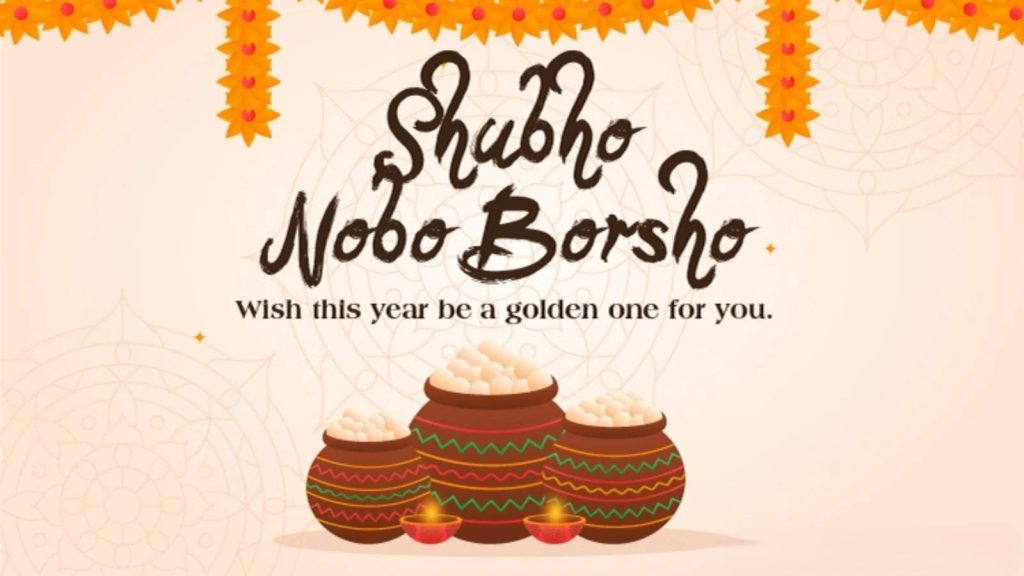Subho Noboborsho 2025: Bengali New Year Festivities With a Sense of Hope and Reflection

On the 15th of April, 2025, all the Bengalis around the globe will unite to celebrate Pohela Boishakh, which marks the beginning of the year 1432 in the Bengali calendar. The phrase “Subho Noboborsho” which means ‘happy new year’ can be heard from Bangali houses, public places, and even over the social platforms. This will not only be a holiday to celebrate the new year but also a period of joy, feeling of togetherness, and unity.
A Celebration for Tradition, Renewed in Spirit
The festival of Pohela Boishakh dates back to the time of Mughal Emperor Akbar in the 16th century. To ease the burden of tax collection, he merged the Islamic lunar calendar with the Bengali solar calendar – giving birth to the Bangla Noboborsho. What began as a government stratagem later blossomed into a rich cultural festivity.
Subho Noboborsho, refers to more than just a date in the calendar. It captures the essence of unity, celebration of identity, and a reminiscence of the past coupled with looking to the future.
Celebrations Throughout Bengal and Elsewhere
Everywhere from Bangladesh and West Bengal all the way to the Bengali diaspora, the day is celebrated with immense fervor and enthusiasm:
Huge, vibrant colorful masks, and floats accompany the spectacular early morning processions like the Mangal Shobhajatra in Dhaka (which stands as UNESCO recognized cultural heritage). The music portray immense symmetry and harmony.
Feasts are complemented by the attendance of culturally rich programs such as the Rabindra Sangeet in the company of family and friends, dressed in traditional garments like – white sarees with red borders and flower bouquets used as head accessories for the women while pajama kurtas for the men all in Kolkata.
As people from the business community begin setting goals and objectives for the coming fiscal year, blessings are sought during the ‘Haal khata’ customary ledger closing rites wherein goodwill is sought for good fortune throughout the year.
The day spans from the longing of the aroma of payesh blended with hilsa fish to the singing of folk dances blended with poetry all simulateneously, symbolizing renewal and cultural pride.
Subho Noboborsho 2025: A Refresh Outlook
A distinct citizenship mark for this year’s Noboborsho. After a three year dash of global economic, environmental, and social uncertainties, the downtime has encouraged other community places to shift efforts towards eco-friendly solutions such as biodegradable materials for decorations and locally sourced food products.
Generation Z finds itself entrenched in prior traditions but still blend things their own way to usher in the festivities, albeit digitally.
Resolutions, Not Just Rituals
Like the Gregorian New Year, Subho Noboborsho is also a time to reflect on one’s achievements and set a goal for the future. However, many Bengalis prefer modest, value-based goals instead- spending more time with friends and family, helping local artisans by purchasing their handicrafts, or learning to cook an ancestral dish.
This is also an opportunity to reconnect with old acquaintances, settle old emotional accounts, and start afresh with grace and gratitude.
The Bengali Spirit: Timeless, Global, and Ever-Evolving
Subho Noboborsho is unique because it has the distinct ability to evolve through time, all the while keeping its essence intact. Be it a villager from Murshidabad, the busy streets of Dhaka, or even a Bengali immigrant living in Toronto, the spirit of the day binds you together with millions in a shared sense of collective nostalgia and renewal.
Often the world is divided with language, borders, and ideologies. Pohela Boishakh is a splendid reminder that joy, identity, and renewal is universal.
Subho Noboborsho! শুভ নববর্ষ!
A toast wih a bang for a year showered with new memories, traditions to cherish, and the warmth of the community. May 1432 be the year where peace, progress, and prosperity enrich us all.
Read more about Subho Noboborsho here.
Do you want to read more blogs like this? Visit Fast Breaking page now!





